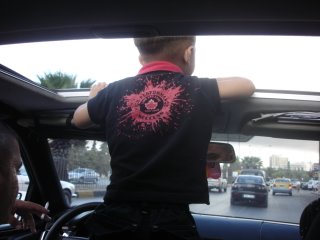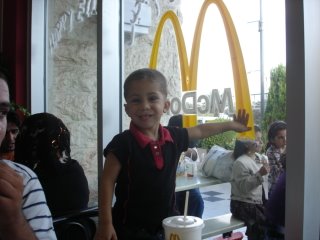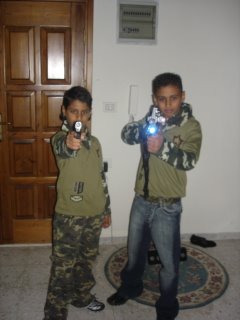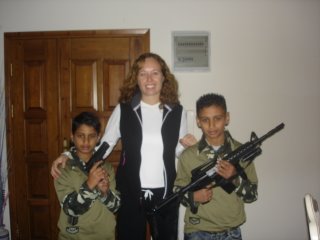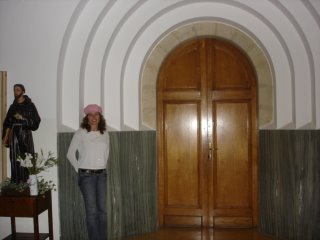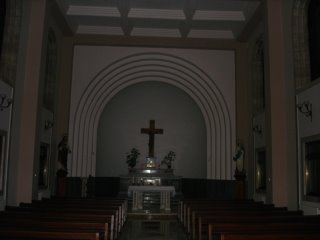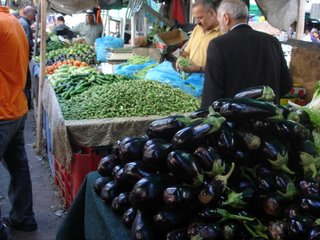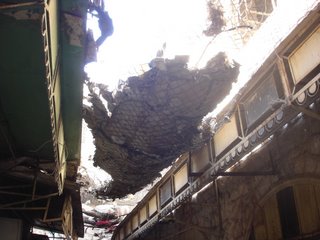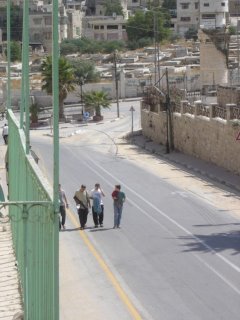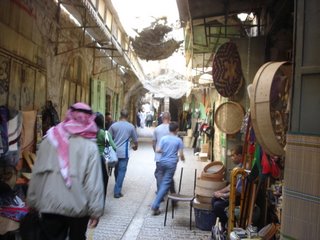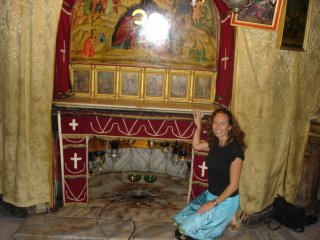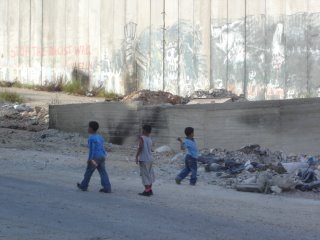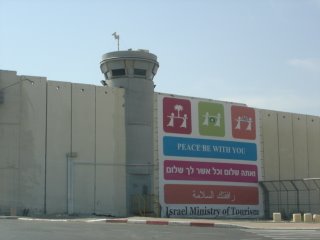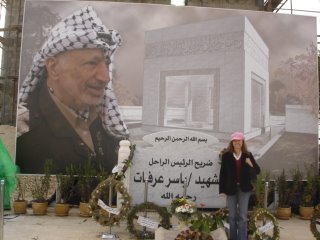
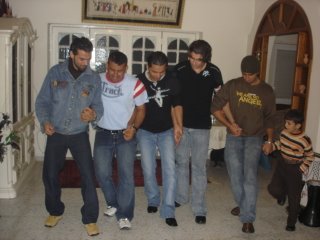
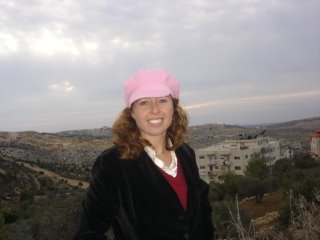
I’m still somewhat in a daze. One minute I was daydreaming of sleeping in my bed in the West Bank after a week of vacation in Jordan, and the next I was staring at a denied entry stamp on my passport. A few days later, I was gazing out the window of an airplane headed back to the States wondering if I would ever be allowed back in Israel (or the West Bank) again.
What did I do to deserve this treatment?
I was a foreigner living in the West Bank, and (heaven forbid!), studying Arabic there.
Yes, I'm having difficulty hiding the sarcasm or muting the sense of outrage I have at basically being deported from the country that we bankroll. There's only one minor upside...it makes for good story-telling, i.e. how many people do you know who have been deported from a country...??
So, here's the story...
I showed up at noon at the checkpoint into Israel on Tuesday, October 31st. My friends who work at the US Embassy in Jordan and I were joking about how since it was Halloween and all, I should dress up as a suicide bomber, and then just say, "Ha ha, it's just my Halloween costume! Happy Halloween!" Considering what happened later, it's a good thing we thought better of it.
I was so excited to go back home after a long Eid holiday and a fabulous trip to Jordan. And to be honest, I wasn’t too worried about getting back in. After all, I still had a month left on my visa and I had a great alibi—that
I was helping with a conflict resolution organization based outside of Tel Aviv and run by a Jewish American. This was true and the director of the organization was extremely well-connected and ready to talk to them about me if needed. I figured that they would hear that and have no problems--after all, the org. was in Israel and the director was Jewish.
So, I got up to the counter and the two female soldiers ask me if it’s my first time traveling to Israel. I said No. They asked when and for how long had I been before. I said just the past two months I’d been there as a tourist and also helping out with this organization. I hoped to get a job with them and stay longer in Israel. They asked all sorts of questions about where I’d been staying, to which I answered in hostels and with various friends. They asked if I planned to go anywhere besides Israel. I said I wanted to stay where it was safe. (Not a lie since I consider the West Bank very safe.) They asked all about the organization and for the details. Then I was told to have a seat and they disappeared behind closed doors with my passport.
They returned after an hour or so and asked me more questions about what I intended to do with this organization and how long I planned to stay in Israel, and how I had been paying for my stay. I said I used to work for the US government and that I had saved up money. They disappeared again and after another hour of waiting and trying to keep a calm thought I was finally summoned in to the back room and was told that the Ministry of Interior had denied my request to enter Israel and I would have to go back to Jordan.
I looked at them in pure shock. “Excuse me? How could this be? What is the reason?”
“I’m sorry,” she said. “You’ll have to take it up with the Ministry of Interior. We’re just the border police. We don't know the reason.”
"What?!!", I yelled, my voice shaking. "You have to give me a reason. This is outrageous!"
Still a completely impassive response. Then I pulled out the big guns... "Do you know I used to work for the US government? This is an insult—as a former diplomat and as an American who basically bankrolls your country, this is totally uncalled for! I'm going to call everyone I know and you're going to be in big trouble," I screamed, trying to hold back the tears.
"Go ahead and do that," said the lady behind the desk, entirely uncompassionate and unfeeling. “Sorry, you must leave right now.” I choked out “This is unbelievable” and slammed the door behind me. I tried to hold back the tears as I was escorted to get my bag in front of a line of people waiting to get in to Israel and who all stared at me curiously, obviously wondering why on earth I had gotten denied.
Outside as I was waiting for the bus to take me back to Jordan, I called the director of the organization where I had volunteered and told her what had happened. Her first words were, "Don't cry, we'll get you out of this." Just hearing that comforting statement made the lump rise in my throat and made me want to cry all the more but I forced the tears back.
She immediately started making phone calls to Israeli officials she knew. She also happened to be sitting with officials of the foreign ministry at that moment. I saw a glimmer of hope.
A couple hours went by and still no progress. The Director said that the Foreign Ministry was working hard with her to persuade the Ministry of Interior (MOI) to let me in but they were not budging. She was confident it would be resolved but maybe not until the next day since the checkpoint would soon be closed. I might have to go back to Amman and try the next day. I sighed, still in shock that this was happening. I waited another hour on the bus, during which a group of 8 Spaniards boarded. I wondered what their story was but was too tired and pissed off to make conversation.
Finally back on the Jordanian side of the border, the officials there recognized me and wondered what had happened. “Why did they deny you?” “No idea,” I replied, saying that they hadn’t given me any reason. I added that I would be back the next day to try again, at which they looked surprisingly and sadly at me. "That never works; once they deny you, you won't get in again."
"Well, I’m going to try anyway," I responded.
“As you like, but know you’re always welcome here in Jordan,” they said kindly.
That was somehow comforting to know that at least one country wanted me. I also mentioned to them that I was especially shocked since I used to work for the US government. They mentioned there was a US official outside right then from the US consulate in Jerusalem and that maybe he would help me. I rushed outside in the hopes that maybe I knew him. He was in the typical US Embassy armored suburban and looked pretty reluctant to roll down his window to this random woman knocking at his door. He eventually opened up and I proceeded to tell him the story, dropping names of people I knew in the consulate. He calmly replied there was nothing he could do. I thanked him and walked back in to the building back to the counter to fill out the paperwork once again. The driver of the US diplomat asked how I was getting back to Amman and I replied that I had no idea. He offered to give me a ride if I could wait a while. I said of course and thanked him profusely. I then walked outside as the first tears of the day overwhelmed me. I felt so deserted by the two countries that the world associated me with, the US and by extension, Israel. And here were Arabs, those people who are supposed to hate us, taking me in and going out of their way for me. Why was my world so upside down?
I was so exhausted by the time we got in the armored suburban I fell asleep right away. The day of tears of frustration and fear had gotten to me. I showed up in Amman 45 minutes later back to my friend's house and we started calling Embassy officials in Jerusalem to tell them the story and get advice on what to do. One official said this had been and continues to be a big problem with Americans getting denied entry and they have been tracking cases and bringing the issue up in general with the Israeli MoI and officials. They said they would raise my issue as well the next day with the MOI.
The org. director also had insights. Through her contacts, she had learned that they had been suspicious of me at the border because I had said I was both a tourist but also working. However, she said the main problem was that I was studying in the West Bank and somehow they had known this. They wondered what exactly I was doing in the West Bank and why I was there. They secretly suspected I worked for the International Solidarity Movement, the militant, left-wing organization that sponsors protests against the wall and blocking bulldozers tearing down Palestinian homes and the like. (I later heard from a friend that they suspect any foreigner who lives in the West Bank of working for them. But I still couldn't believe they made a stretch from former US official to crazed bulldozer-blocker. "Anyway, not to worry," she continued. "Tomorrow we will take care of it."
It felt like groundhog day as I once again the next day took the same half hour cab ride to the bus station, waited for passenges to fill it up, drove the hour and a half to the border, paid another exit visa from Jordan, and waited the hour for the bus to take us to the Israeli side. My stomach was in knots the entire time as I tried to remain calm and tell myself that today was a new day and that I could expect wonderful things.
As I got in line at the window, I noticed with glee that the girl behind the counter was different. She was much nicer too and asked the same usual questions but with a smile on her face. She then thumbed threw my passport, frowned at the denied entry stamp and told me to have a seat while she went to talk to her colleagues in the back room. My heart sank. "Oh no, here we go again."
A gentleman from behind those ominous-looking secret doors came out to talk to me after a while. I said, "Look, I have a plane ticket going home November 15th. All my things are in Israel. Please just let me in to get my things and if it doesn't work out to work full-time at the organization, I'll fly home."
To my surprise he was very friendly but he shook his head sadly. "I'll talk to the MOI again, but I don't think they will let you in." I called the director again and gave her an update. She said she and her contacts in the Foreign Ministry had been trying all morning to persuade the MoI and they were all outraged at how obstinate MoI was being. The FM had even suggested to the director that she go on television with the story to show MoI how serious this was and upset they were. Thankfully, she told them that this kind of press was not what I was after and wouldn't necessarily help my case.
I told her I would get in touch when I got the final word. After another hour or so, another gentleman came out of the doors with two passports--mine and that of a Palestinian-American. Both "Entry Denied". He repeated the same spiel I had heard the other night and ushered us directly to the bus going back to Jordan. All the while, tears were streaming down my cheeks as I thought of my predicament and the injustice of it all. Mid-sememster into the program at Birzeit; all my things there; all my rent paid; my plane ticket out of there...but most of all, my life was there--my neighbors, my roommate, my community, Arabic, my life!
I sat down on the pavement, called my roommate in Palestine, and cried.
After a few hours of waiting for the bus to go back to Jordan, I finally got a hold of the director again and told her the situation. She sighed and said, "Okay, I've had the phone number of the number 2 in the MoI but have hesitated to use it. I didn't want to make it even worse by troubling the head honchos about you. But, at this point, it couldn't get any worse! Let's do it."
Five minutes later, the director called back. Her instructions were straight out of a thriller movie. "Janessa, listen carefully. I want you to get your bag and get off the bus right now and walk into the checkpoint. They're expecting you. Go right now before they close!" She explained she could only get me a week, but that was better than nothing.
I told the bus driver I had to get off the bus and while he protested, I ignored him, grabbed my bag, and ran to the guard in front of the checkpoint. I said, "I have to go inside. They're letting me in to Israel." The guard frowned at me and looked exasperated. By this point, he'd been dealing with my hell-raising for two days straight and he thought this was just the latest antic. "Listen," I said, "Just take the phone and listen." He finally agreed and I handed him the phone so the director could tell him what was going on. After a few seconds, he straightened up and started nodding vigorously. He hung up, handed me the phone, and immediately radioed something in Hebrew to someone. Five seconds later, an official from inside came out and escorted me to the back room inside the building. This time, they were courteous and nice. Ten minutes later, I had an Israeli visa stamped in my passport and I was walking through the gates to the Israeli side. The security people looked in astonishment at me walking through with a huge smile on my face.
"They let you in?? Congratulations!," said one guard.
"Thanks," I replied. "I guess miracles do happen!"
On the other side, I got on a bus to Jericho, hoping to find a cheaper taxi from there. I met a Palestinian-American on the bus who had also been put through the ringer in trying to get in to Israel. He was 21 and was coming to check out Birzeit University. (Of course he didn't tell the border guards that.) He was from Texas and hated the Middle East, he said, but his Dad was forcing him to finish college in the Middle East so he could learn Arabic. He had just gotten out of three weeks in a Jordanian prison for being caught with marijuana and was bitter. I chatted with him a bit about Birzeit but mainly daydreamed about surprising my roommate and neighbors, whom I had just told I was denied entry once again. They had no idea the decision had been so suddenly reversed.
Two hours later, I was finally at home, knocking on my front door, and hugging my roommate who started crying and screaming when she saw me. I had to explain to everyone not to get too excited since I only had a week and then had to leave. It was so bittersweet. I went to school the next day and explained what had happened to the program officials. They sadly shook their head and said there was nothing they could do. "This is why we told all of you students never to say a word about the West Bank and Birzeit. They do not want any foreigners here witnessing their occupation and the situation here." Well, I was really beginning to believe that was true. They don't give out visas to students wanting to study in the West Bank and even journalists we'd met had had to lie and say they had no intention of coming to the West Bank. Most NGO professionals also had to stay in country on tourist visas since work permits are nearly impossible to get if you're working in the West Bank. So, everyone lives in this perennial fear of every three months having to leave the country and praying you can get back in. Since I was the first of my class to leave and get denied, now all my fellow students were agonizing about what their fate would be. They concluded that if I, an American and former official, was turned away, then they were basically goners.
My plan was first to go to Jordan and wait for a work visa from there, but the director of the organization said the MoI was mandating that I go back to the States and apply from there. If I did not, she would be in trouble and I would never be allowed back in the country again. They were waiting for me at the airport, she said, and my name was on a checklist showing if I left from there or not. "So, does this mean I'm effectively being deported? Am I on some blacklist? Am I in deep trouble?" "Not yet," she said. "You won't be if you go home."
The next few days were filled with bouts of tears, last-minute purchases of Palestinian knick-knacks, a visit to Arafat's tomb (the only tourist destination in Ramallah), and a rousing going away party. I told everyone I hoped to be back in a month but secretly I had a nagging feeling I may never be back to study there again. This is what made it so hard to leave--I had this suspicion this wonderful experience was over for good. What had I learned? Was it enough? What would I miss out on? Just over two months just didn't seem enough...there was so much more I felt I needed to experience and learn. Oh well, I would have to trust that there was a bigger plan of which I was not aware.






